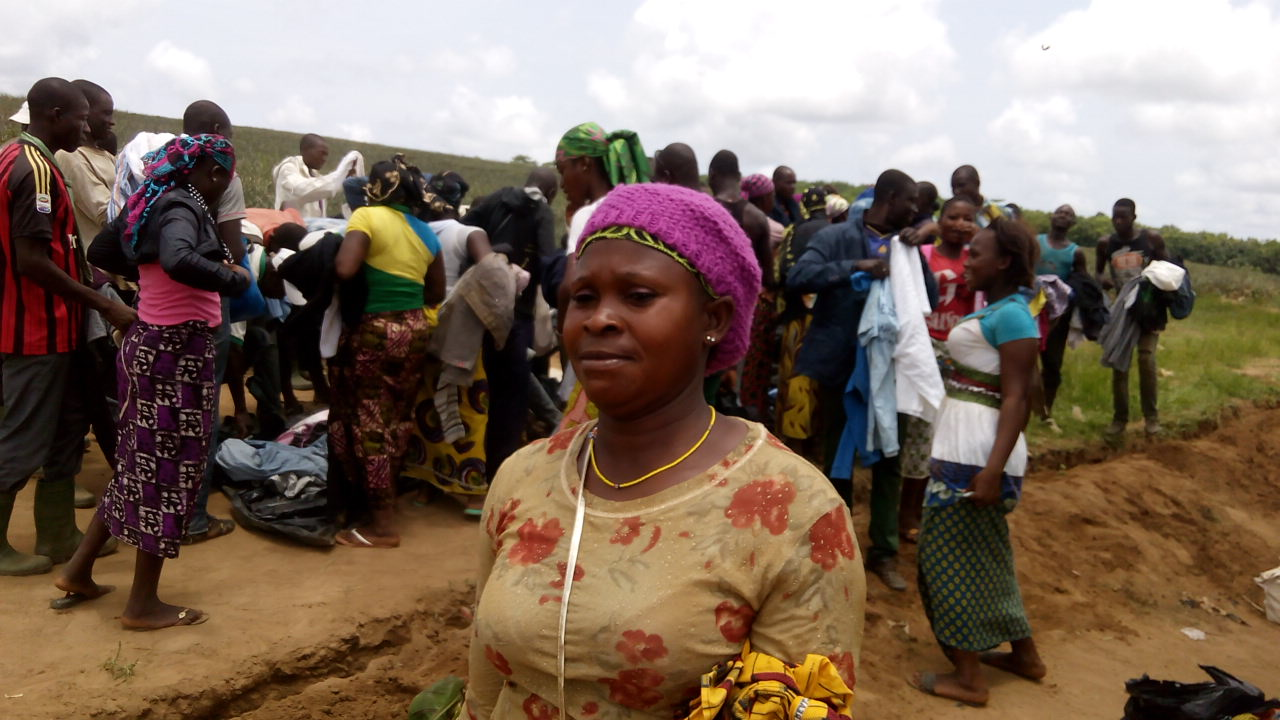New value for old clothes at Ivoire Organics

Sea containers leave our registered office in Duisburg for “Ivoire Organics” in Côte d’Ivoire at least once per year. There are many different things in the containers, but mainly agricultural machines and other materials for the producer organisation, which are not available in the local area or can only be sourced with a great deal of effort. However, there is still room for clothes in the gaps between the strategically filled container contents.
The last clothes delivery to Ivoire Organics was organised by our employee Marnie Kathem after she returned from her trip to Côte d’Ivoire. She asked friends and acquaintances for freshly washed, no-longer-needed clothes – of course in good condition. Her request did the rounds and in the end she managed to get together numerous bags of clothes. “It’s not really a big deal,” says Marnie. “For us in Germany, it is hardly any effort to sort through our old clothes. But I have seen that the clothes are really appreciated by our employees in Côte d’Ivoire. They are a bonus, an addition to their wages.”
You are perhaps asking yourself: why clothes for Côte d’Ivoire? One possible explanation may be provided by a comparison of the economic power of the two countries: whilst the gross domestic product in Germany was around 37,100 euros (roughly £28,500) per head in the year 2015, it was infinitely lower in Côte d’Ivoire in the same period of time – just 1,247 euros (roughly £957) per head. The textile industry no longer exists in Côte d’Ivoire and has to be rebuilt from the bottom up. The majority of new clothes are imported from Asia and not everyone can afford them. Locally produced clothes are currently the product of craftwork, rather than being intended for use by the masses. “On my trip to the North, I saw weaving looms where women were weaving materials with traditional patterns right beside the road. These were being bought by well-heeled people. The average Ivorian buys his clothes from the market. You have food for sale on one side of the market and thousands of old clothes on the other side. It is a real trade in itself,” explains Marnie Kathem. Many people rely on trading these old clothes or reworking the items to make their living.
With our work in local areas – sustainable organic farming in the North and South – we are able to offer the population secure and guaranteed employment with a regular wage, something which is not as obvious as it may seem in a country in which there was great civil unrest as recently as 2011. The economy, which was actually growing back then, had to cope with further heavy financial losses. The economic situation has since been stabilised and the country’s economic power continues to grow on an annual basis. Our current developp.de programme with our partner Ivoire Organics has also boosted the modernisation of the local infrastructure.
Text: Visnja Malesic
Pictures: BioTropic GmbH
As of: May 2016
You are perhaps asking yourself: why clothes for Côte d’Ivoire? One possible explanation may be provided by a comparison of the economic power of the two countries: whilst the gross domestic product in Germany was around 37,100 euros (roughly £28,500) per head in the year 2015, it was infinitely lower in Côte d’Ivoire in the same period of time – just 1,247 euros (roughly £957) per head. The textile industry no longer exists in Côte d’Ivoire and has to be rebuilt from the bottom up. The majority of new clothes are imported from Asia and not everyone can afford them. Locally produced clothes are currently the product of craftwork, rather than being intended for use by the masses. “On my trip to the North, I saw weaving looms where women were weaving materials with traditional patterns right beside the road. These were being bought by well-heeled people. The average Ivorian buys his clothes from the market. You have food for sale on one side of the market and thousands of old clothes on the other side. It is a real trade in itself,” explains Marnie Kathem. Many people rely on trading these old clothes or reworking the items to make their living.
With our work in local areas – sustainable organic farming in the North and South – we are able to offer the population secure and guaranteed employment with a regular wage, something which is not as obvious as it may seem in a country in which there was great civil unrest as recently as 2011. The economy, which was actually growing back then, had to cope with further heavy financial losses. The economic situation has since been stabilised and the country’s economic power continues to grow on an annual basis. Our current developp.de programme with our partner Ivoire Organics has also boosted the modernisation of the local infrastructure.
Text: Visnja Malesic
Pictures: BioTropic GmbH
As of: May 2016